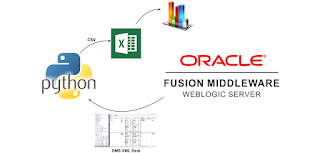wrk is a modern HTTP benchmarking tool. Using a simple CLI interface you can put simple load on HTTP services and determine latency, response times and the number of successfully processed requests. It has a LuaJIT scripting interface which provides extensibility. A distinguishing feature of wrk compared to for example ab (Apache Bench) is that it requires far less CPU at higher concurrency (it uses threads very efficiently). It does have less CLI features when compared to ab. You need to do scripting to achieve specific functionality. Also you need to compile wrk for yourself since no binaries are provided, which might be a barrier to people who are not used to compiling code.
Parsing the wrk output is a challenge. It would be nice to have a feature to output the results in the same units as CSV or JSON file. More people asked this question
and the answer was: do some LuaJIT scripting to achieve that. Since I'm
no Lua expert and to be honest, I don't have any people in my vicinity that are, I decided to parse the output using Python (my favorite language for data processing and visualization) and provide you with the code so you don't have to repeat this exercise.
You can see example Python code of this here.
Articles containing tips, tricks and nice to knows related to IT stuff I find interesting. Also serves as online memory.
Showing posts with label csv. Show all posts
Showing posts with label csv. Show all posts
Saturday, February 1, 2020
Monday, December 19, 2016
WebLogic Server: Automate obtaining performance metrics from DMS
Oracle provides the Dynamic Monitoring Service (DMS) as part of WebLogic Server which is extremely useful if you want to obtain aggregated data of an environment in case of for example a performance test. The data which can be obtained from DMS is extensive. This varies from average duration of service calls to JVM garbage collects to datasource statistics. DMS can be queried with WLST. See for example here. On example script based on this can be found here. You can also directly go to a web-interface such as: http://<host>:<port>/dms/Spy. The DMS Spy servlet is by default only enabled on development environments but can be deployed on production environments (see here).
Obtaining data from DMS in an automated fashion, even with the WLST support, can be a challenge. In this blog I provide a Python 2.7 script which allows you to get information from the DMS and dump it in a CSV file for further processing. The script first logs and uses the obtained session information to download information from a specific table in XML. This XML is converted to CSV. The code does not require an Oracle Home (it is not WLST based). The purpose here is to provide an easy to use starting point which can be expanded to suit specific use-cases. The script works against WebLogic 11g and 12c environments (has been tested against 11.1.1.7 and 12.2.1). Do mind that the example URL given in the script obtains performance data on webservice operations. This works great on composites but not on Service Bus or JAX-WS services. You can download a general script here (which requires minimal changes to use) and a (more specific) script with examples of how to preprocess data in the script here.
Obtaining data from DMS in an automated fashion, even with the WLST support, can be a challenge. In this blog I provide a Python 2.7 script which allows you to get information from the DMS and dump it in a CSV file for further processing. The script first logs and uses the obtained session information to download information from a specific table in XML. This XML is converted to CSV. The code does not require an Oracle Home (it is not WLST based). The purpose here is to provide an easy to use starting point which can be expanded to suit specific use-cases. The script works against WebLogic 11g and 12c environments (has been tested against 11.1.1.7 and 12.2.1). Do mind that the example URL given in the script obtains performance data on webservice operations. This works great on composites but not on Service Bus or JAX-WS services. You can download a general script here (which requires minimal changes to use) and a (more specific) script with examples of how to preprocess data in the script here.
Subscribe to:
Posts (Atom)

